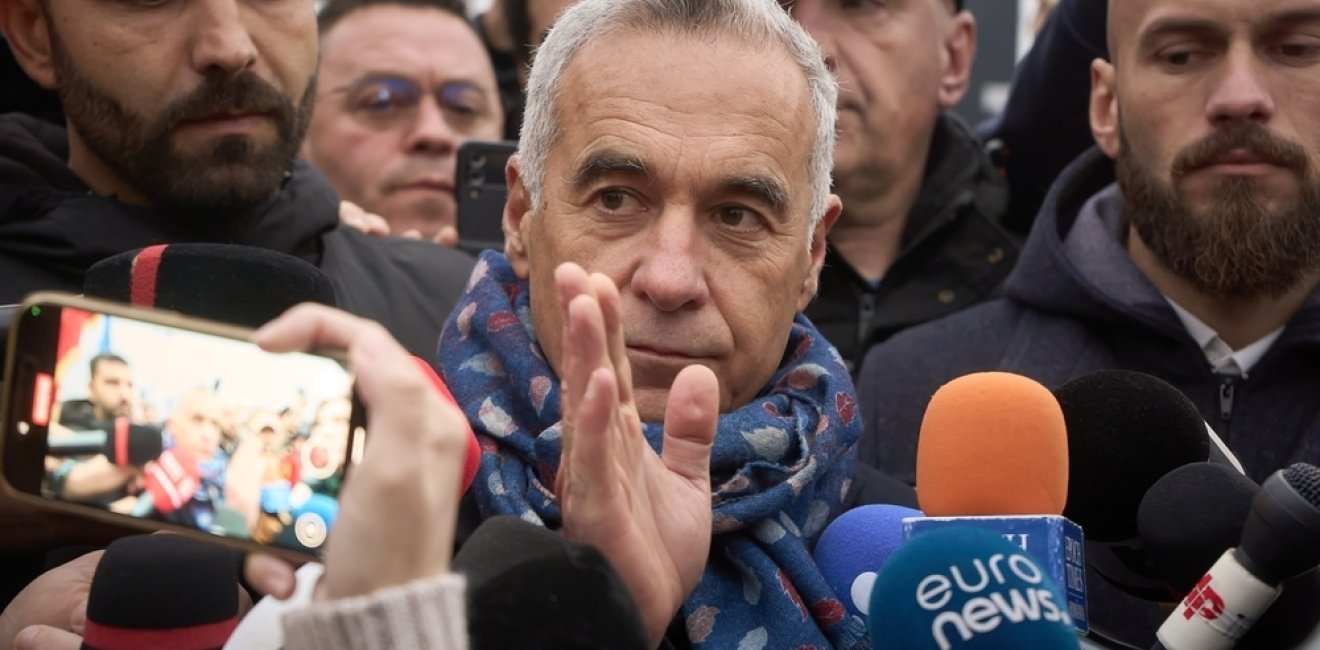
A blog of the Kennan Institute
The presidential runoff in Romania was scheduled for December 8 but was canceled after Romania’s Constitutional Court annulled the results of the first round just forty-eight hours before the vote. To back this unprecedented ruling, the court cited nontransparent use of digital technology and artificial intelligence in the electoral campaign, and election violations attributed to interference of “state actors,” which other Romanian authorities identified as Russia.
Authorities and many in Romanian civil society believe the winner benefited from a social media campaign that was similar to influence operations run by the Kremlin in Ukraine and Moldova.
The court’s decision came after a stunning surge to first place by far-right candidate Călin Georgescu, who had been polling in the single digits until the vote actually took place. In another unprecedented move, Romania’s president declassified intelligence reports that supported the court’s ruling. The documents allege that Georgescu’s victory was facilitated through various illegal means, including cyberattacks and a Russian-style TikTok campaign.
Disruptive Campaigning
Călin Georgescu, a political outsider with no party affiliation who skipped major TV debates and barely registered in national polls, secured nearly 23 percent of the vote after the first round of elections. The 62-year-old Georgescu’s package also includes EU and NATO skepticism, antifeminism, and pro-Russian views.
Georgescu started his career in 1992 at Romania’s Environment Ministry before transitioning to the Foreign Ministry. He later represented Romania in various UN agencies in Vienna and Geneva. During the COVID-19 pandemic, he emerged as a vocal critic of vaccines, frequently promoting conspiracy-driven narratives.
The first-round results led to the resignation of the pro-EU, center-left prime minister, Marcel Ciolacu, as leader of the Social Democratic Party (PSD), the party of Romania’s post-communist establishment. Ciolacu, once considered the front-runner, finished third, with 19.15 percent of the vote, trailing behind pro-EU and pro-NATO center-right Elena Lasconi, a former TV anchor and the mayor of Câmpulung. This marked the first time since Romania’s 1989 revolution that a PSD candidate failed to advance to the second round of a presidential election.
The results shocked many Romanian and Brussel circles not just because of a dramatic shift in Romania’s political landscape but also because Georgescu conducted an unorthodox campaign. He operated without formal headquarters, led no visible organization, and refused to participate in televised debates with other candidates. According to Georgescu, his campaign cost “not a single penny” and was run entirely by volunteers.
In his public statements since the Constitutional Court ruling, Georgescu addressed the EU and the U.S. president-elect Donald Trump, accusing “powerful interest groups” of orchestrating the annulment. Echoing the rhetoric of Georgia’s ruler Bidzina Ivanishvili about a “global war party,” Georgescu wrote on X (formerly Twitter): “Romania has the biggest border with Ukraine and has the biggest corruption system in the EU! To get more money and power, this groups [sic] need to invoke a war, which is good for them ... and very bad for all of us.”
Romania, which shares a 400-mile border with Ukraine, has prioritized boosting defense spending and providing aid to its war-torn neighbor. The country recently increased its defense budget to meet NATO’s 2-percent GDP guideline. Notably, Romania is also the site of a major military development project,Mihai Kogalniceanu, set to become the largest NATO base in Europe, surpassing Germany’s Ramstein Air Base.
Echoes of the Past, Amplified by Tech
In stark contrast, Georgescu’s campaign centered on reducing Romania’s reliance on foreign food and energy, cutting aid to Ukraine, and tackling the country’s rising cost of living. Speaking to Reuters before the vote, he said that if elected, he would stop Ukrainian grain exports through Romania. In a BBC interview, he praised Donald Trump and the Hungarian populist leader Viktor Orbán. He also described Vladimir Putin as a “patriot and a leader,” though he added, “But I am not a fan.”
On TikTok, Georgescu crafted an image of himself as a “true Romanian and a strong leader,” appearing in traditional clothing while riding horses, attending church services, track running, and practicing judo—Vladimir Putin’s signature sport. By December 2024, his TikTok account had amassed over 580,000 followers and 6.4 million likes.
When questioned about potential ties to Russia, Georgescu consistently denied any such connection: “[I have] no relationship with Russia, only with the Romanian people. We are talking about the lack of any connection with Russia and about the fact that my only relationship is with the Romanian people.”
What Georgescu’s TikTok campaign omitted was his praise for Romania’s former dictator and Nazi ally. He has referred to Ion Antonescu, Romania’s leader during World War II who was sentenced to death for his role in the Holocaust, as a national hero and “martyr.” Georgescu has also repeatedly glorified the Iron Guard, Romania’s fascist movement from the interwar period. In 2020, he described the Iron Guard as “the strongest essence and expression of health and self-will born from the Romanian people.”
Enhanced Social Media Campaigning
Georgescu’s election campaign heavily relied on TikTok videos, boosted by bot activities to make them go viral. Some bots also attacked his rivals. Using bots to boost a candidate’s popularity is a long-used tactic and was widely used during the 2016 U.S. presidential campaign and multiple political campaigns throughout the world.
One of the intelligence documents declassified by the Romanian president revealed that 797 TikTok accounts created in 2016 had recently been reactivated to support Georgescu’s candidacy. Additionally, 25,000 more TikTok accounts became active just two weeks before the elections. TikTok’s algorithm allegedly failed to label recommended content as election-related, violating Romanian election laws.
Account activity may have been orchestrated by a “state actor,” suggested another document. The agency further assessed that “a highly skilled digital marketing firm” was likely behind the campaign, with those involved demonstrating expertise in circumventing TikTok’s platform regulations. The documents do not directly state that Russia tried to swing the election but strongly suggest it, Politico observes in its analysis of the declassified documents.
The documents also disclosed that one account paid $381,000 to influencers promoting Georgescu’s campaign, directly contradicting his earlier claims that his campaign had no funding. In response, Romania’s telecom watchdog has called for TikTok’s suspension, citing concerns over foreign election interference and online manipulation. Authorities have launched investigations into the election’s integrity and urged the European Commission to examine potential “algorithmic amplification” that may have boosted Georgescu’s visibility—leaving many voters unaware of his true political affiliations.
Despite concerns about manipulative tactics and artificial social media backing, Georgescu’s popularity among Romanians is a reality. “It seems to have been driven largely by widespread frustration with mainstream parties,” Anda Iulia Solea, lecturer in cybercrime at the University of Portsmouth, concludes in her analysis of the role social media played in the Romanian election.
The opinions expressed in this article are those solely of the author and do not reflect the views of the Kennan Institute.
Author


Kennan Institute
After more than 50 years as a vital part of the Wilson Center legacy, the Kennan Institute has become an independent think tank. You can find the current website for the Kennan Institute at kennaninstitute.org. Please look for future announcements about partnership activities between the Wilson Center and the Kennan Institute at Wilson Center Press Room. The Kennan Institute is the premier US center for advanced research on Eurasia and the oldest and largest regional program at the Woodrow Wilson International Center for Scholars. The Kennan Institute is committed to improving American understanding of Russia, Ukraine, Central Asia, the South Caucasus, and the surrounding region through research and exchange. Read more

Explore More in The Russia File
Browse The Russia File
Chechnya as a Model of Modern Russia

Russia’s Indigenous Communities and the War in Ukraine

Gas and Power in a Changing US–Russia Relationship

